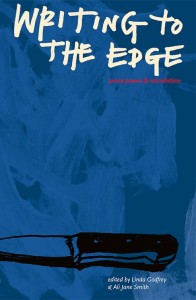 1. What inspired you to write the prose poem/microfiction which will appear in Writing To The Edge?
1. What inspired you to write the prose poem/microfiction which will appear in Writing To The Edge?
A memory inspired this story; a small image, a tiny chunk of nostalgia at the edge of my mind. The bones of this story are autobiographical. My father and I would fish and camp around the back beaches of Byron Bay so I thought it would be a perfect backdrop for this piece of fiction. I love writing about everyday moments and situations. The little things, the special things. We all go through them, whether they are humbling or just down right painful. This microfiction was inspired by one of those moments.
2. Tell us about your process. (Do you start sparse and widen out, or do you write down every possible association and cut back? Do you research the subject matter you are writing about? Is it pure intuition?) Take us through an example if you want.
For me it’s usually intuition. I find it difficult to write about subjects that are foreign to me personally. I often start quite sparse and then widen out. For example, this story started with just an image I remembered as a kid. It was of my father fishing down by the shore, his head-torch cutting in and out when he would move. That’s all I start with, then I just write. I see where the story leads me. Sometimes I follow a path I already know, a path I have already been in reality. Most times however, it’s totally fictional.
I am what my novel teacher, Toni Jordan, calls a knitter. I start small and precise and usually continue like this, slowly knitting through the story, editing as I go. I do not know what’s up ahead or at the end of the road, I find out when I get there. It’s pretty tedious and time consuming but this way usually knocks off an extra draft or two. This is as opposed to a quilter who patches big chunks of story at a time. If a quilter steps back, they can see the whole story spread out across the bed.
If I do need to research something for a story, I find it very rewarding and enjoyable. It’s like leaving my comfort zone of what I know and it gives me a whole new element to write about without the usual distractions and conflicts of interest, however this doesn’t make it any simpler.
3. What advice do you have for other writers? (About the first or last line? About how to choose the title? Do you follow any rules?)
I think the first and last line is very important. The opening line is like a door. Once you read it, you open that door and walk into the story. Just like the front door of a house, it can tell you a lot about the inside. It should drag you in. It should make you want to keep walking through the story until you reach the back door, that last line. I like the opening line of a story to be ambiguous. I like the final line to wrap everything up in a nice bow or even leave it in a mess for the reader. Sometimes I enjoy reading a story and after the last line, sitting back and thinking about it for a while, wondering what just happened. That’s why both lines are equally important; they can shape or even change the meaning of the story entirely.
I think titles for short stories can be anything; a word, character, place, setting or metaphor from within the story. Title rules are different for short stories compared to novels. In novels, the importance of a title is paramount due to marketing, readership etc. Those restrictions don’t really exist with the short story because it’s usually in a book of stories with its own title or an anthology. Keep it ambiguous! Let the readers find out what type of story it is through its content, not its title.
4. Who or what inspires your writing?
Many authors from different times and countries inspire me, but one setting inspires my writing the most and that is Australia. I grew up on the coast and I find this setting, background and language creeping into many of my stories and especially my novel. The authors who inspire me over and over again are Tim Winton, Nam Le, Toni Jordan, Junot Diaz, Hemmingway, Bukowski, Raymond Chandler and Thom Jones.
5. Tell us what you do if you haven’t written anything in a while and you want to get started writing again? Could you share your favourite writing exercise with our readers?
I wish someone could tell me because I’m in no position to answer! I’m three quarters through a novel and it’s a fight everyday to get words on the page. It never gets any easier. For me, it’s purely mental. I need a little kick-start. I might need to read a page from a favourite book, or see a picture or a photo that reminds me of my novel. It could be a song or a swim at the beach. It gets me at the worst times. I always get the urge to write when I don’t have my computer or a notepad. It may just be my mind playing games.
One bit of advice I’ve always believed in was to keep writing. Write everyday; a page, a paragraph, a line, a word. There may come a time when you’re dying for the right line or paragraph and you may find that you’ve already written it.
Follow Us:
Share this page:

